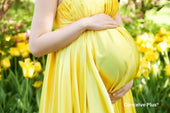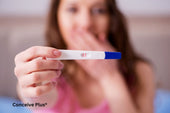Can You Get Pregnant from the First Time Exploring First Time Pregnancy Chances

It’s a question a lot of people have, "Can you get pregnant from the first time?" Yes, you absolutely can. Unprotected sex, even the first time, can result in pregnancy. Fertility doesn’t wait for experience—it’s just biology doing its thing. Let’s break this down.
How Pregnancy Happens the First Time
So, can you get pregnant at your first time? Yep. Pregnancy occurs when sperm fertilizes an egg. This happens during ovulation, the part of the menstrual cycle when an egg is released from the ovaries. If you’re ovulating and sperm enters the vagina, there’s a chance for conception, even if you have a 26 day menstrual cycle getting pregnant is possible.
It doesn’t matter if it’s your first time or your 50th. If the timing lines up, pregnancy is possible. For some, ovulation is super regular, making the chances even higher. Others might have less predictable cycles, but the risk is still there. And no, being a virgin doesn’t provide any "protection" against getting pregnant.
First Time Sex Pregnancy Chances
The chances of pregnancy during first-time sex depend on a few factors:
- Timing: If sex happens close to ovulation, the likelihood increases [1].
- Sperm Survival: Sperm can live in the reproductive tract for up to 5 days. So even if ovulation is a few days off, pregnancy can happen [2].
- Health: The overall reproductive health of both partners also matters [3].
Some believe the first time is "safe." It’s not. Whether it’s your first time or your 100th, unprotected sex can lead to pregnancy.
Top Tip: If you’re not ready for pregnancy, always use protection. Birth control methods like condoms or pills can reduce the chances significantly.
Boosting Fertility Naturally
Trying to conceive naturally? Supporting your body with the right nutrients is a good place to start. Here are some ingredients that can help:
- Folic Acid: Known for helping with healthy cell development, it’s crucial for pregnancy [4].
- Vitamin D: This one’s a big deal for hormonal health and improving ovarian function [5].
- Myo-Inositol: Especially helpful for women with PCOS, it supports egg quality and regular ovulation [6].
- CoQ10: A strong antioxidant that protects eggs from oxidative stress [7].
These nutrients don’t just improve fertility but also prep your body for a healthy pregnancy.
Top Tip: If you're planning to conceive, start taking a prenatal vitamin early. It gives your body the head start it needs.
Can You Get Pregnant for Your First Time Without Actual Sex?
Yes, you can. It’s rare, but possible. For example, if sperm gets near the vaginal opening, pregnancy could occur. Sperm is determined, and it doesn’t need full intercourse to do its job.
And what about can you get pregnant your first time without penetration? The short answer is still yes. Pre-ejaculate (pre-cum) can carry sperm, and if it makes its way into the vagina, conception can happen.
Top Tip: Always consider protection, even during non-penetrative activities. It reduces the risk of both pregnancy and STIs.
Factors That Affect Pregnancy Chances
A lot of things can impact whether someone gets pregnant the first time:
- Age: Fertility peaks in your 20s and starts to decline after 30 [8].
- Cycle Regularity: Irregular periods can make it harder to predict ovulation [9].
- Health and Lifestyle: Smoking, poor diet, and high stress can all affect fertility [10].
Nutrients like zinc, magnesium, and selenium can help balance hormones and support reproductive health. For men, ingredients like L-carnitine and maca root can improve sperm quality and motility.
Top Tip: Maintaining a balanced diet and healthy lifestyle can go a long way in supporting fertility.
The Bottom Line
So, "Can you get pregnant from the first time?" Yes, you can. Pregnancy can occur anytime sperm meets an egg during ovulation, whether it’s your first time or not. Using contraception is crucial to prevent unintended pregnancy and protect against STIs.
For those trying to conceive, focusing on fertility-supporting nutrients can help improve your chances naturally. Take care of your body, and remember that preparation is key to a healthy pregnancy journey.
FAQs
Can you get pregnant your first time if no one finishes?
Yes, pre-ejaculate can carry sperm, which may lead to pregnancy.
What are first time sex pregnancy chances if I use a condom?
When used correctly, condoms are highly effective but not foolproof.
Can you get pregnant at your first time during your period?
It’s unlikely but still possible if ovulation occurs early.
Is it necessary to take supplements when trying to conceive?
Supplements with nutrients like folic acid and CoQ10 can support fertility.
Can you get pregnant for your first time through non-penetrative acts?
Yes, if sperm gets near the vaginal opening, there’s a small chance of pregnancy.
Citations
- Dunson, D. B., Colombo, B., & Baird, D. D. (2002). Changes with age in the level and duration of fertility in the menstrual cycle. Human reproduction (Oxford, England). Available at: https://pubmed.ncbi.nlm.nih.gov/11980771/
- Björndahl L. (2024). What is required for better progress in clinical and scientific andrology involving sperm assessments?. Asian journal of andrology. Available at: https://pmc.ncbi.nlm.nih.gov/articles/PMC11156447/
- Hull, M. G., Glazener, C. M., Kelly, N. J., Conway, D. I., Foster, P. A., Hinton, R. A., Coulson, C., Lambert, P. A., Watt, E. M., & Desai, K. M. (1985). Population study of causes, treatment, and outcome of infertility. British medical journal (Clinical research ed.). Available at: https://pubmed.ncbi.nlm.nih.gov/3935248/
- Bailey, L. B., & Gregory, J. F., 3rd (1999). Folate metabolism and requirements. The Journal of nutrition. Available at: https://pubmed.ncbi.nlm.nih.gov/10203550/
- Lerchbaum, E., & Obermayer-Pietsch, B. (2012). Vitamin D and fertility: a systematic review. European journal of endocrinology. Available at: https://pubmed.ncbi.nlm.nih.gov/22275473/
- Unfer, V., Carlomagno, G., Rizzo, P., Raffone, E., & Roseff, S. (2011). Myo-inositol rather than D-chiro-inositol is able to improve oocyte quality in intracytoplasmic sperm injection cycles. A prospective, controlled, randomized trial. European review for medical and pharmacological sciences. Available at: https://pubmed.ncbi.nlm.nih.gov/21608442/
- Bentov, Y., & Casper, R. F. (2013). The aging oocyte--can mitochondrial function be improved?. Fertility and sterility. Available at: https://pubmed.ncbi.nlm.nih.gov/23273985/
- Fritz, R., & Jindal, S. (2018). Reproductive aging and elective fertility preservation. Journal of ovarian research. Available at: https://pmc.ncbi.nlm.nih.gov/articles/PMC6087539/
- Fehring, R. J., Schneider, M., & Raviele, K. (2006). Variability in the phases of the menstrual cycle. Journal of obstetric, gynecologic, and neonatal nursing. Available at: https://pubmed.ncbi.nlm.nih.gov/16700687/
- Augood, C., Duckitt, K., & Templeton, A. A. (1998). Smoking and female infertility: a systematic review and meta-analysis. Human reproduction (Oxford, England). Available at: https://pubmed.ncbi.nlm.nih.gov/9688387/



















